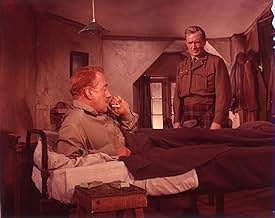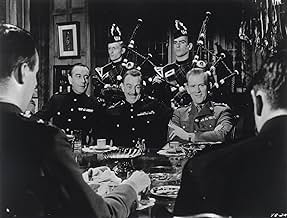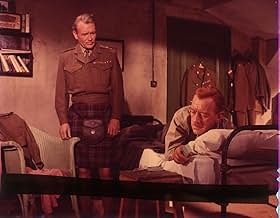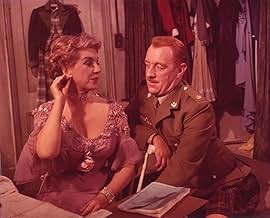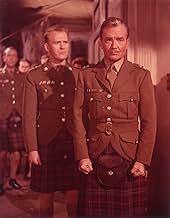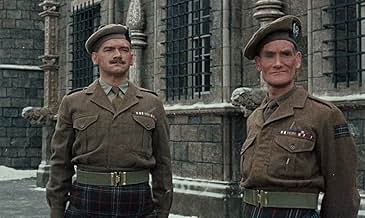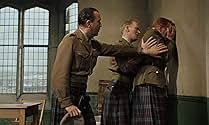Após a Segunda Guerra Mundial, o Comandante em exercício do Regimento das Terras Altas, que subiu das fileiras, é substituído por um Comandante educado em Oxford, em período de paz, levando ... Ler tudoApós a Segunda Guerra Mundial, o Comandante em exercício do Regimento das Terras Altas, que subiu das fileiras, é substituído por um Comandante educado em Oxford, em período de paz, levando a um conflito dramático entre os dois.Após a Segunda Guerra Mundial, o Comandante em exercício do Regimento das Terras Altas, que subiu das fileiras, é substituído por um Comandante educado em Oxford, em período de paz, levando a um conflito dramático entre os dois.
- Indicado a 1 Oscar
- 2 vitórias e 7 indicações no total
Avaliações em destaque
The book is a slim volume, but is fast moving and full of character. Set in provincial Scotland, the flavour of the film is as strong as the novel (by James Kennaway who also wrote the screenplay) but the characterisation by the actors builds on and then surpasses the script. I note that neither of the actors is Scottish and this amazes me. Maybe I should seek advice from a Scot on this matter.
We never leave the barracks or the quiet army town and so learn only by rumour how Jock Sinclair, on some blasted field at the centre of El Alamein saved his regiment and turned the battle. Half the officers and men were dead, the cause lost, yet his spirit and the force of his will brought him a battlefield promotion to acting colonel. The Regiment is what he lives for.
Several years later, in peacetime, the army catches up with its paperwork and sends a proper officer to take back the reins. Basil Barrow arrives unexpectedly from a desk job and Sandhurst. His assignment is to organise and civilise the men, long gone wild under Jock's supervision. John Mills plays the rather impotent lonely Barrow as an accentless and educated man. There are "dark rumours" amongst the men that he may be English.
The clash between the two men commences immediately on their meeting and ends in scenes of mourning and redemption.
This is an actors film. There are few effects and much of the action is centred on one or the other of Guinness or Mills. Sinclair is a piper, this gives him an almost spiritual air and his feel for music (the Tunes of Glory) is the first area of contention between the two Colonels. When Jock leads his men in a wild and unruly reel with arms flailing and much shouting and yipping at a society ball the ensuing fit from the uptight and conservative Mills is wonderful. He trembles and shakes and we do likewise.
The film builds and builds to a finale full of Tunes of Glory and we come to an understanding about both men, as they come to understand each other.
I am not as enamored of "Tunes of Glory" as I am of, say, "Bridge on the River Kwai," but it is without question a powerful movie. The conflict between Sinclair and Barrow is palpable; I think, in particular, of Mill's violently trembling rage during the dancing scene, and Guinness's dismissive ridicule of Barrow's deepest confidences ("toy soldiers!") during his attempt to con him into clemency. Sinclair's grief-stricken collapse at the end is truly an unforgettable scene and a tribute to Guinness's power.
I've heard of this movie for a long time, and knew that it was well-liked (Guinness considered it one of his best performances), but it wasn't what I was expecting. It's a psychological study of these two men, and, with the Barrow character, an early examination of PTSD before it was called that (he was a P. O. W. In a Japanese camp, and was tortured). The accents can be a bit much, and if you don't like bagpipes, this is definitely not the movie for you, but I thought the acting was terrific, and the slow-burn drama builds to a shattering conclusion.
Guinness plays an angry and blustering Scottish officer who may also be an alcoholic (he at least is a problem drinker and shows many signs of alcoholism). The film begins with this popular officer throwing a farewell party, of sorts, with the men in his command. It seems that Guinness was given temporary command but a replacement (John Mills) is due to arrive shortly--dashing Guinness' hopes for this position becoming permanent.
Because Guinness' character is so very flawed and petty, he does much to try to undermine the new C.O.. In particular, Mills is a "by the book" sort of officer and Guinness ignores changes Mills orders--and by example, derision and a lack of respect for Mills spreads through the ranks. Instead of behaving like officers and gentlemen, the men behave like this is some sort of popularity contest and they show contempt for their new leader. None of this is helped by Guinness' drinking, as it gets him in trouble and creates serious problems for the regiment.
While Mills, as usual, does a great job in the film playing a man who is suffering from Post-traumatic Stress Disorder, the film is definitely Guinness'. His boorish character is a great example of him once again immersing himself into a character and the way he responds to the tragedy near the end of the film gives the character great depth and a bit of sympathy--something you needed to make this a stand-out film.
The bottom line is that this film is extremely well-crafted. The acting is universally excellent, the script tense and well-written and the film is great unless you are the type of person who demands lots of action. While a film about the military, this is no action film. Wonderful.
Você sabia?
- CuriosidadesSir Alec Guinness was offered the role of Lieutenant Colonel Barrow, but asked for the role of Major Sinclair instead. He then suggested Sir John Mills for the other role.
- Erros de gravaçãoPipe Major MacLean is never shown with a set of bagpipes. In particular, he is a mere observer at band practice. A pipe major is not only the leader of the band but also its chief instructor, and it is unthinkable that he would not play an active role in all practices.
- Citações
Major Jock Sinclair, D.S.O., M.M.: We're on a first name basis in this regiment. Your first name is Derek. My first name is Major.
- ConexõesFeatured in Film Extra: Alec Guiness (1973)
Principais escolhas
- How long is Tunes of Glory?Fornecido pela Alexa
Detalhes
- Data de lançamento
- País de origem
- Idioma
- Também conhecido como
- Tunes of Glory
- Locações de filme
- Stirling Castle, Stirling, Escócia, Reino Unido(establishing shots)
- Empresas de produção
- Consulte mais créditos da empresa na IMDbPro
- Tempo de duração
- 1 h 47 min(107 min)
- Cor
- Proporção
- 1.66 : 1


